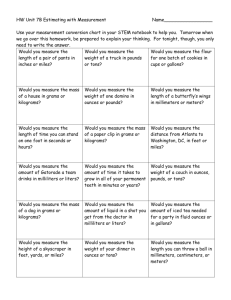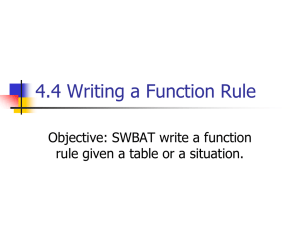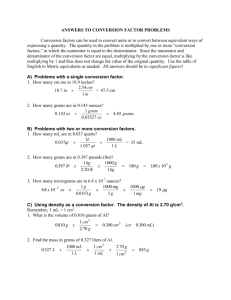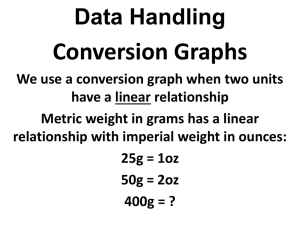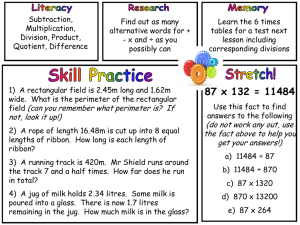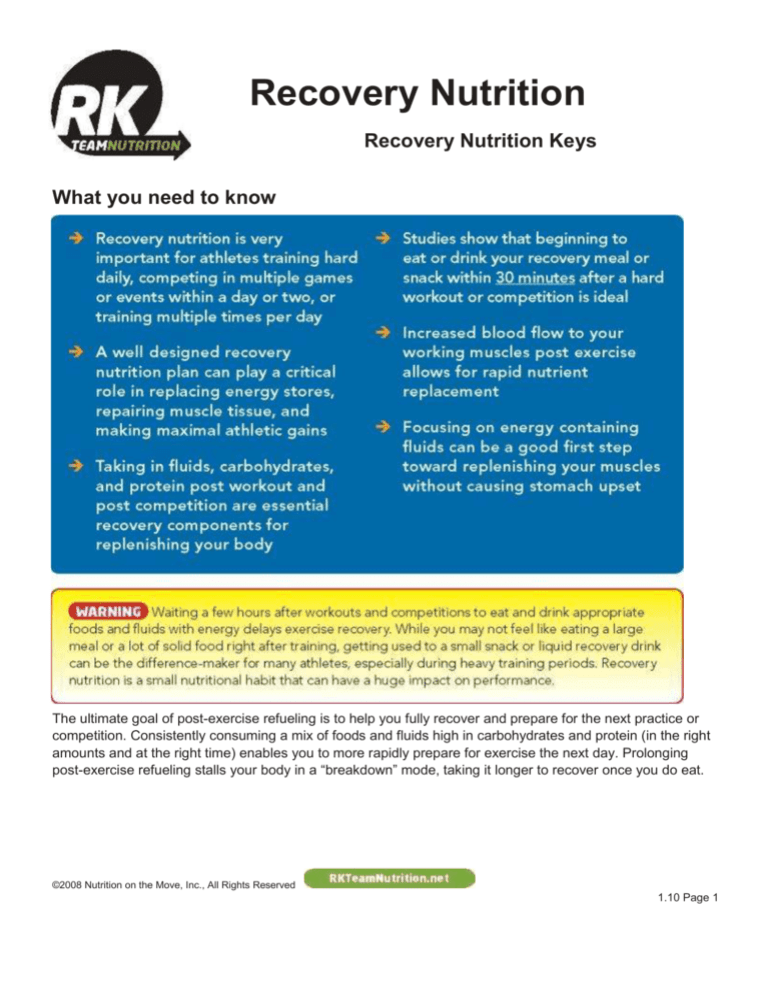
Recovery Nutrition
Recovery Nutrition Keys
What you need to know
The ultimate goal of post-exercise refueling is to help you fully recover and prepare for the next practice or
competition. Consistently consuming a mix of foods and fluids high in carbohydrates and protein (in the right
amounts and at the right time) enables you to more rapidly prepare for exercise the next day. Prolonging
post-exercise refueling stalls your body in a “breakdown” mode, taking it longer to recover once you do eat.
©2008 Nutrition on the Move, Inc., All Rights Reserved
1.10 Page 1
The 1-2-3 approach to recovery: fluids, carbohydrates, and protein
1. Fluids: Every recovery nutrition plan should include plenty of fluids to help your body get back to your pre-workout
or pre-competition body weight. Almost all weight lost during exercise can be attributed to fluid losses. Drink 2–3
cups of fluid for every pound you’ve lost in a workout or competition. Sports drinks are a great recovery option
(better than water), as they have carbohydrates (some also have protein) and electrolytes to help you retain fluids
better.
2. Carbohydrates: Think of carbohydrate as your body’s “muscle energy replenisher.” When you train hard in
workouts or compete at a high level, you use up much of your body’s stored carbohydrate (in the muscle, liver, and
bloodstream). Consuming high-carbohydrate foods within 30 minutes “re-stocks” carbohydrate stores for the next
workout or competition so it’s available when you need it. Including high glycemic index carbohydrates may be
optimal post-exercise. Examples include: sports drinks, fruit snacks, white bagels, waffles, muffins, sweetened rice
cakes, sugary cereals or cereals like corn flakes or puffed rice, baked potato chips, melon, pretzels, jelly beans,
and honey.
3. Protein: Protein is essential in recovery because it helps repair muscle tissue and reduce muscle breakdown after
workouts. So, while carbohydrate refuels the energy in the muscle, protein repairs that muscle so it’s ready to go
for the next workout. Protein is also essential for gaining muscle mass (protein synthesis). Thus, to maximize
muscle strength and size, add protein to your recovery meal or snack.
Your recovery plan
Have a post-exercise nutrition plan in place to consistently have recovery fuel options at your fingertips. Perhaps
recovery shakes or bars are already set up for your team. If so, take full advantage of them every day. Or, maybe
you need to bring a recovery snack with you so you hit the 30-minute recovery time slot. Or, you may be in good
shape by quickly heading to a dining hall for your meal after workouts. All of these options can work well for
making recovery nutrition part of your training plan.
Post-exercise carbohydrates should be easily digested and well-tolerated by you. For example, if
your stomach does not tolerate milk products right after competition, it would be unwise to select
yogurt. Find high-carbohydrate foods with some protein that are easy to consume and build them
into your daily post-exercise routine. Liquids could be your best option because they are easily
tolerated and rapidly digested.
Food Groups
Best Choices
Grains/Starches
Breads, cereal, rice, pasta, granola bars,
cereal bars, potatoes, sweet potatoes,
bagels, tortillas, crackers, corn, and peas
Orange, grape, apple, cherry, or cranberry
juices; bananas, grapes, apples, melon,
berries, or canned fruit
Milk, chocolate milk, yogurt, smoothies,
cheese, cottage cheese
Recovery shakes, instant breakfast drinks,
chocolate or strawberry milk
High in carbohydrate (at least 20-30 grams)
and moderate in protein (5-20 grams)
Sports drinks, soy milk, honey
Fruits/Juices
Dairy Products
Liquid Meals
Sports Bars
Other Liquids
©2008 Nutrition on the Move, Inc., All Rights Reserved
1.10 Page 2
For quick recovery fuel, look for foods or liquids that contain both carbohydrate
and protein. Examples: recovery shakes, instant breakfast shakes, milk, chocolate milk, strawberry milk, yogurt,
cereal/milk, soy milk, fruit/yogurt smoothies, peanut butter sandwiches, sports bars, trail mix, trail mix bars, a cheese
stick and crackers, or 100% juice and sunflower seeds.
The Right Time and Amount
If you are training hard consistently, your recovery meal may be the most important meal you have during the
day. Timing is critical. The longer you wait to refuel, the longer it takes to initiate the recovery process. Take in
at least 50 grams of carbohydrates and 15 grams of protein within 30 minutes of finishing exercise AND again
every 2 hours for the next 4 hours. The longer or more aerobic your activity is, the more carbohydrates you
require.
Timing after workout or
competition
Within 30 minutes
AND 2 hours post-workout
AND 4 hours post-workout
Amount of Carbohydrates
50 grams +
50 grams +
50 grams +
Amount of Protein
15 grams +
15 grams +
15 grams +
20 Recovery Options
Remember the 1-2-3 plan for recovery within 30 minutes:
1. Fluids (at least 20 ounces) 2. Carbohydrates (at least 50 grams) 3. Protein (at least 15 grams)
10 Recovery Options for your locker or gym bag:
™
™
™
Recovery shake (e.g. Gatorade Protein Recovery Shake, Muscle Milk Collegiate , Go Energy Recovery Shake ) + 16
ounces water
™
1 portable 12-ounce chocolate, strawberry, or vanilla milk (e.g. Horizon Organic portable cartons) + 1 granola bar + 16
ounces of water
™
1-2 portable pre-made instant breakfast drinks (e.g. Carnation Instant Breakfast )
4 graham cracker/peanut butter square “sandwiches” with an 8-ounce 100% juice box + 16 ounces water
™
™
16 ounces sports drink (e.g. Gatorade , Powerade ) + 1 sports bar + 16 ounces water
1 cup trail mix (equal parts cereal, sunflower seeds, and dried fruit) + 16 ounces water
24 ounces sports drink + 1/3 cup almonds
2 high-protein, whole grain mini bagels with peanut butter + 16 ounces water
2 oatmeal packets mixed with 2 Tablespoons peanut butter and hot water + 16 ounces water
™
16 ounces sports drink + 1 cup high-protein cereal (e.g. Kashi Go Lean Crunch )
10 Recovery Options to make quickly on your own:
Homemade recovery shake #1: 1 cup skim milk + 1 packet instant breakfast mix + 1 banana, blended with ice
Homemade recovery shake #2: 1 cup lowfat vanilla yogurt + 2 Tablespoons peanut butter + 1 banana + 1 cup skim
milk, blended with ice
Homemade recovery shake #3: 1½ cups vanilla soy milk + 1 cup frozen unsweetened strawberries + 1 cup 100% orange
juice, blended with ice
1–2 peanut butter and jelly sandwiches + 16 ounces 100% apple juice
1 can (2 cups) ready-to-eat chicken noodle soup with crackers and 2 cups skim milk
1 turkey/cheese sub + raisins + 16 ounces water or milk
1 single-serving macaroni and cheese + 16 ounces skim milk
1 cup yogurt with granola + 16 ounces orange juice
2 cups whole grain cereal + 2 cups skim milk
1 chicken or bean burrito + 16 ounces skim milk or 100% juice
This handout was designed by Sports Dietitians Michelle Rockwell, MS, RD, CSSD and Susan Kundrat, MS, RD, CSSD to provide general education. For specific
concerns, refer to your sports medicine team. ©2008 Nutrition on the Move, Inc., All Rights Reserved
1.10 Page 3


